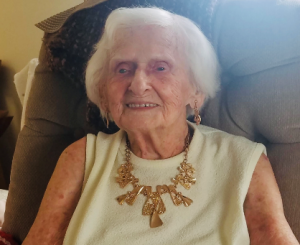LAWRENCE – While the physical effects of COVID-19 have been widely documented, 100-year-old Rita Ducheneau has struggled with isolation at Marguerite’s House Assisted Living on the Mary Immaculate Health/Care Services campus in Lawrence.
To ease her patient’s loneliness, Merrimack Valley Hospice Case Manager Meredith McNeilly, RN, BSN recently presented a tablet to Ducheneau and taught her how to conduct video chats. In addition to communicating with her caregivers, social worker, chaplain and a music therapist, Ducheneau is thrilled to have more personal contact with her two daughters, Jeanne and Shirley, who have been restricted from visiting from their respective homes in New Hampshire.
Help The Valley Patriot Stay in Business
Your Donation of ANY Amount helps
“Meredith was a great teacher!” Ducheneau said. “It has been good to learn new things, challenge myself and keep my mind active. Also, using the tablet is definitely better than just talking on the phone. You get to see people’s eyes and their smiles. You don’t know how much I’ve missed that.”
Born in Lawrence on December 5, 1919, Ducheneau was the fourth of nine children of Irenée “Pete” Romeo Nolet and Delia Albine (Lamontagne) Nolette. Ducheneau left high school at age 16 (though she earned her GED in her 40s) to work at Gerber Shoe Factory, where she was so successful that she was sought by area shoe designers.
“I loved sewing,” recalled Ducheneau, whose mother taught her the skill. “I had to be the best in the room.”
In 1938, Ducheneau married Henry Leonel, her husband of 58 years whom she called Leo. In the late 1940s, her mother helped care for her children for two years while Ducheneau was hospitalized with tuberculosis. After she recovered, Ducheneau joined the Women’s Auxiliary Police Department, where she oversaw air raid drills and was instrumental in forming the crossing guard program in Lawrence.
Ducheneau, who moved to Methuen and ultimately retired from Raytheon, enjoyed swimming, boating, snowmobiling, ballroom dancing, playing cards, quilting and traveling. She remained active by participating in exercise classes and playing bingo and Pokeno after moving in September 2016 to Marguerite’s House, where she is known as a fashionista whose jewelry and shoes – some of which she made – match her carefully styled outfits.
Given her patient’s outgoing nature, McNeilly said she wasn’t surprised that Ducheneau was eager to tackle new technology.
“When I first met Rita in June, she was quite withdrawn,” said McNeilly, who visits Ducheneau weekly. “She’s such a people person. It didn’t take long before the companionship she experienced through the tablet enabled her natural self to shine.”
Ducheneau credits McNeilly’s patience with making it all possible.
“I don’t have the tablet by my side every minute like some people,” Ducheneau said, “but I’ll enjoy it until we can get back to hugs and kisses.”
Elena Finney, RN, BSN, hospice and palliative care clinical manager at Merrimack Valley Hospice, said video visits have given the home health and hospice industry an additional way to provide face-to-face support to patients, caregivers and families.
“There is so much we can do with virtual support to enhance the physical, spiritual and psychosocial well-being of our patients and their loved ones,” Finney said. “With education and the quick touch of a button, the entire hospice team has the ability to ‘visit.’ The nurse is able to assess a new concern, or the music therapist can engage with the patient in singing a song. I am excited to see how this tool continues to grow, as well as its ongoing use in our everyday practice.” ◊

